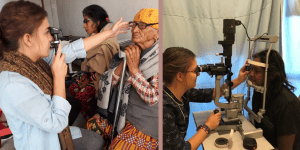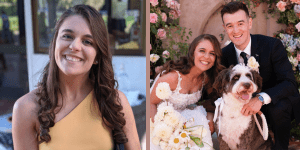2:0min

With a passion for travelling and improving eye health in regional areas, no two days are the same for South Australian outreach optometrist Stephanie Callisto. We caught up with Stephanie, who is also a Flinders University lecturer and OV/SA Board member, to discuss what motivates her and how she stays grounded.
What were some of your experiences as a student and how did they help shape your current career?
My passion for accessible optometric care began during a nursing placement in Port Pirie, South Australia. Witnessing the impact of specialised care on a regional community was eye-opening. Later, during my optometry studies, I sought opportunities to improve access to care while exploring different cultures. A placement in Nepal with Flinders University was particularly impactful. Seeing patients with vision loss due to untreated refractive errors and cataracts was deeply moving. Even providing reading glasses allowed some to continue working.
Similarly, in the Kimberley region of Western Australia, working in remote Aboriginal communities highlighted the challenges faced by both patients and healthcare professionals. These experiences strengthened my clinical skills, deepened my empathy and solidified my commitment to patient-centred care. They taught me the importance of adaptability and collaboration, inspiring my mission to overcome healthcare barriers.
What has been your career path since graduating?
After graduating from Flinders University in 2018, I worked in an independent practice in Port Augusta, South Australia. Here I built on my university skills, including myopia control, postoperative care and complex RGP fittings. I also participated in outreach clinics. I then moved to Adelaide, working in ophthalmology clinics specialising in vitreoretinal disease, ocular oncology, medical retina and paediatrics, providing a strong foundation for my clinical knowledge.
Inspired by my own lecturers, I eagerly accepted the opportunity to lecture at Flinders University, aiming to inspire future optometrists.
Where are you currently working and in what capacity?
I currently divide my time between practising at ophthalmology clinic, Pennington Eye Clinic and lecturing at Flinders University. At the clinic, my primary role is to improve patient access to timely care. This involves assisting with procedures, triaging referrals, explaining treatment plans, obtaining informed consent and coordinating care. My role has evolved to include independent patient consultations, contributing to a multidisciplinary approach.
I also conduct monthly regional clinics, providing vital care to patients who struggle to travel to Adelaide. At Flinders University, I work with final-year optometry students, guiding their transition into professional practice, which is incredibly rewarding.
What excites you about these roles?
I thrive in a dynamic environment that encourages continuous learning. My work in ocular oncology has developed my skills in ocular ultrasound and lesion identification. I enjoy the intellectual challenge of diagnosing complex cases, utilising state-of-the-art technology and collaborating with local optometrists. The fast-paced nature of vitreoretinal disease, with its urgent cases, is also a source of excitement and fulfillment.
What motivates you as an optometrist?
My motivation stems from a desire to provide high-quality, timely care and empower future professionals. Through experiences in regional South Australia and refugee clinics, I’m driven by the importance of accessible, culturally sensitive care. I’ve seen the devastating effects of delayed treatment due to barriers to access, and I’m committed to ensuring patients receive respectful, tailored care.
How much time do you spend away from home at the remote clinics?
I am away three days a month. The remote clinics are busy, but providing care closer to patients’ homes is deeply fulfilling. I’ve built lasting relationships with patients and feel I’ve integrated well into their community.

How do you maintain a healthy life balance?
I’m fortunate to have wonderful support from my husband, Ollie, my colleagues, and my boss. My energetic dog, Lucy, ensures that Ollie and I stay active and spend quality time together.
You’re a director on the OV/SA Board, how does that complement your professional life?
Serving as a director on the OV/SA Board has enhanced my advocacy, communication and decision-making skills. Working alongside leading optometrists has broadened my perspective and deepened my appreciation for the profession’s role in public health. I love this!
What is your advice to newly graduated optometrists seeking to make a difference to the optometry profession?
Prioritise patient care and establish a sustainable work-life balance. Pursue your passions by engaging with your community, volunteering and collaborating with other healthcare professionals. Embrace lifelong learning and stay curious.
The future of optometry is bright and innovative; committed optometrists are essential for transforming patient care.
Tagged as: members, regional, Remote & rural optometry